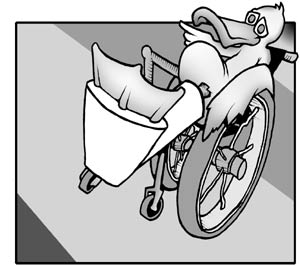 The response of arch-Republican Senator Orrin Hatch was a whining demand that Democrats should "quit trying to score political points" with this issue. What? Telling politicians to not try to score political points is like telling an accountant to stop doing math. It's what they do.
The response of arch-Republican Senator Orrin Hatch was a whining demand that Democrats should "quit trying to score political points" with this issue. What? Telling politicians to not try to score political points is like telling an accountant to stop doing math. It's what they do.I also didn't know that only one President (Andrew Jackson) had ever been censured in U.S. history. More Presidents have been impeached than censured. Given the depth of disagreements between the executive and legislative branches that have come up throughout our history, it's remarkable that there has been such deference on the part of Congress. And the censure doesn't really have any teeth to it; it simply expresses the sense of the Congress that the President has gone too far. It doesn't purport to restrict the President's powers or remove him from office. It's not the equivalent of a
 "no confidence" vote in a parliamentary system, precisely because the U.S. does not have a parliamentary system.
"no confidence" vote in a parliamentary system, precisely because the U.S. does not have a parliamentary system.If the censure resolution passes Congress, George Bush will still be President. His political authority will be undermined somewhat. But then again, he's on his way out of office anyway; there are less than a thousand days of the Bush Administration left no matter what. It's not like this has been a Golden Age for America. It has been an age of increased political polarization and it sure looks like Bush is surrounding himself with "yes" men. So if the President has screwed up, someone's got to tell him so. Does this mean "weakening" the Presidency? No -- it might weaken this particular President, but so what? We've had Presidents in wartime who lack strong political backng before. Lincoln, Truman, McKinley. Nor are we at "war" in the traditional sense of the word -- we are in a state of heightened military activity in ostensibly friendly territories (Iraq, Afghanistan, Pakistan, and at home).
And as for the President's political strength, here's the reality: the President has got a hard core of supporters who would back him up no matter what. Seriously -- if he held a joint press conference in the Rose Garden with the Prime Minister of Ireland, and halfway through taking questions from the press took out a knife and slit the Prime Minister's throat on live TV in front of the entire world, something like 25% of Americans would defend the President and say "Well, the guy must have had it coming; and hey Presidents sometimes have to do things like this."
Another aspect of political reality: there is another hard core of people who would criticize the President no matter what he did or didn't do. If Bush were to personally don combat fatigues, fly out to Afghanistan, and troop out into the mountains armed with nothing more than a Bowie knife, a compass, and a couple sticks of chewing gum, and emerge three days later in Islamabad with Osama bin Laden himself bound and gagged as a prisoner, about 20% of Americans would complain that he hadn't done it fast enough, complain that Osama had picked up a few bruises along the way, and demand the appointment of a special counsel to inquire into whether the President had committed prisoner abuse.
 An aside: I'm no fan of prisoner abuse, and I think Americans who abuse prisoners deserve to become prisoners themselves. But if it's Osama we're talking about, I think I could relax my idealism just a little bit. Should we capture him alive (big assumption), I would be pleased to see Osama get a trial. But when he's convicted (not if -- he's confessed many times in situations which would be wholly admissible), he should get executed by being thrown off the top of the newly-rebuilt World Trade Center. We can write a check to his family for the Eighth Amendment violation after the fact.
An aside: I'm no fan of prisoner abuse, and I think Americans who abuse prisoners deserve to become prisoners themselves. But if it's Osama we're talking about, I think I could relax my idealism just a little bit. Should we capture him alive (big assumption), I would be pleased to see Osama get a trial. But when he's convicted (not if -- he's confessed many times in situations which would be wholly admissible), he should get executed by being thrown off the top of the newly-rebuilt World Trade Center. We can write a check to his family for the Eighth Amendment violation after the fact.So the question of whether the President is weakened is a question of whether people who are neither Bush-haters nor Bush-lovers will support him on a particular policy. It is not unpatriotic to disagree with the President on a particular policy, even one relating to the "war" effort. Bush has said so himself.
While it seems to me the hard core of Bush-haters is smaller than the hard core of Bush-lovers, they also seem to be louder. Both groups are equally unthinking in their responses to various activities; and therefore both groups are detestable and ultimately harmful to the political health of the country. We need a healthy political debate, because having a healthy political debate is part of what it is to be a free people.
That means that testimony like Dean's needs to be heard and evaluated. That I agree with Dean on this point is only part of the point. The point is, of course the Democrats are trying to score political points. So are the Republicans. That's what it's all about. When the Green Bay Packers play the Chicago Bears, and the Bears score a touchdown, Green Bay don't say, "Hey, quit it!" Instead, they go out on the field and try and score more points themselves. Sometimes they succeed, sometimes they don't. It wouldn't be much of a game if one team didn't play.
And it wouldn't be much of a democracy if one point of view were not expressed.

No comments:
Post a Comment
Thoughtful, insightful, or informative comments are always welcome. Advertising will be deleted permanently. TL reserves the right to delete comments in his sole discretion (but rarely does so other than for advertising).